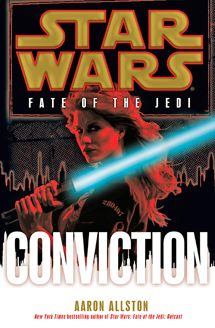In researching for my blog post on the “Luke Skywalker Must Die” controversy awhile back, I was surprised to find out that the “Star Wars: Fate of the Jedi” series has gotten a lot of negative reviews. Personally, I think it’s a step up from its predecessor, “Legacy of the Force,” and I’ve been enjoying it.
And now, with the seventh of the nine entries, “Conviction” (May, hardcover), Aaron Allston gives the series great momentum heading into the final installments by Christie Golden and Troy Denning.
The primary complaint about “Fate of the Jedi” is that it focuses too much on politics, something that was notably absent from the movies that made us love “Star Wars” to begin with. Other than Tarkin’s almost-throwaway line about how the Emperor has dissolved the Senate and the regional governors are now in control, there are no politics to be found in the original trilogy, just war.
But the prequel era, with the Senate chamber’s tiers of floating pods, is filled with political machinations. And while I haven’t exactly reveled in that type of storytelling, I have accepted it as part of “Star Wars.” So when the Jedi depose increasingly erratic Galactic Alliance leader Daala by staging an assault on the Senate building — and then install a temporary triumvirate of a Jedi and two senators — I found it thrilling and plausible.
Allston does well by the character who appears in the cover art, despite her surprisingly scant page-time. I’ve always liked Tahiri, largely because of her tragically truncated love affair with the late Anakin Solo. When she escapes from prison — in a nice twist, on the heels of Daala — I totally started rooting for her, and I hope Golden and Denning have more tricks up their sleeves for our favorite barefoot Jedi.
The highlight of “Conviction,” though, is the development of Vestara, the Sith adept who is hanging out with Luke and Ben Skywalker on their mission to save the galaxy from the evil menace Abeloth. We’ve suspected from the beginning that Vestara would eventually turn to the light side, being influenced by Ben — paralleling Luke turning Mara to the light side — but that doesn’t make the journey any less compelling. Here, Vestara writes — but doesn’t send — letters to her father, in a tone as if their relationship was as loving as Luke’s and Ben’s. It’s not — she has a Sith daddy, after all — and it’s clear that she longs to join the Jedi family, particularly Ben’s. Still, there’s just a shadow of conflict there that puts the conclusion of her arc in doubt.
So far, Abeloth hasn’t worked for me as a villain, but now the fact that her appearance hasn’t been described yet (at least not that I can recall) lends her a mysterious air. And now that she is in league with the Sith, the battle lines are more clear for the final two books.

I wasn’t crazy about the return to Nam Chorios, where the Skywalkers and Vestara pursue Abeloth. This was the titular “Planet of Twilight” from Barbara Hambly’s book, one of the most difficult reads in “Star Wars” literature. As a capper, it gave an unhappy ending to the Luke-and-Callista romance, which is drudged up again here (but thankfully given closure). The planet, with its life-sucking drochs (giant beetles) and random Force storms, is depressing, but not in a way where I enjoy spending time there.
Meanwhile, Han and Leia and their granddaughter Allana venture to the sands of Klatooine, where former slaves of the Hutts are holding a makeshift chautauqua, and generally wanting to join the Galactic Alliance. Interestingly, Allston throws in a tent where droids are speaking out for their freedom, which allows for an unusually traditional science-fiction thread about what constitutes a sentient and free-thinking being. Michael Reaves also explored this angle with I-Five in his “Coruscant Nights” trilogy (I think Kristine Kathryn Rusch’s “The New Rebellion” also was about a droid rebellion, but I can’t remember the details of that one). It’s always refreshing when big ideas get peppered in with the war and — like it or not — politics of “Star Wars.”
There’s a lot to like about “Conviction,” which gains non-stop momentum at about the halfway mark. Allston is a slightly better writer than Golden or Denning; still, I think he’s given them enough of a head start in this relay race that they’ll have no trouble taking the baton to the finish line with the last two books.

